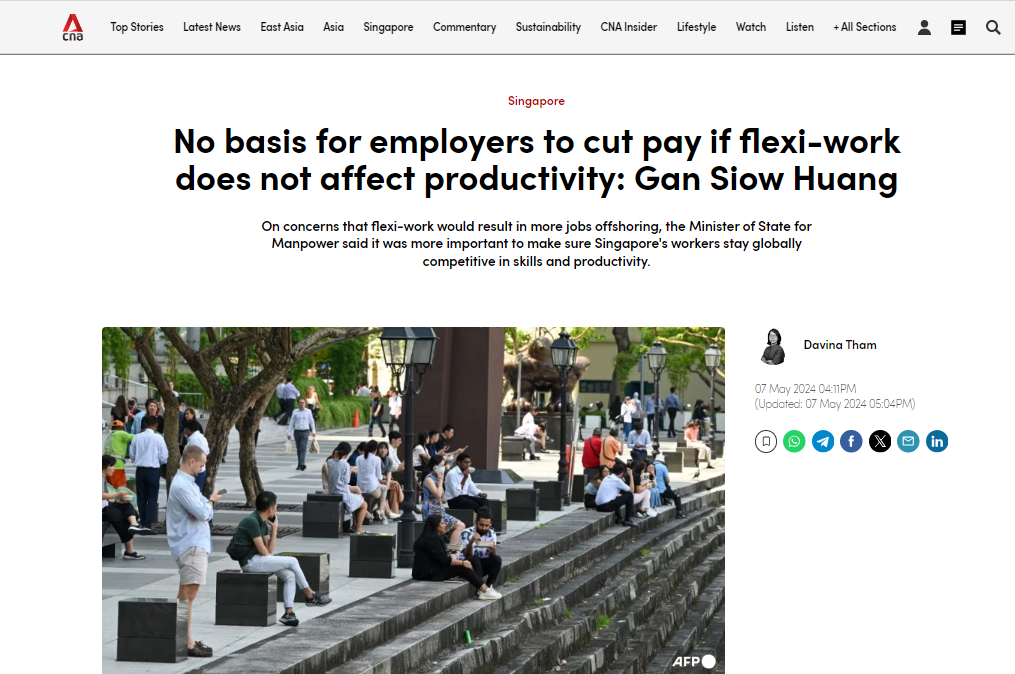Flexi-Work Arrangements in Singapore: Maintaining Fair Pay
 Staytion
Staytion
In her insightful CNA article, "No basis for employers to cut pay if flexi-work does not affect productivity: Gan Siow Huang," Davina Tham sheds light on a crucial aspect of contemporary work dynamics and equitable compensation.
Gan Siow Huang's assertion that there should be no justification for employers to reduce pay if flexi-work arrangements do not compromise productivity is significant. It underscores the importance of evaluating employee contributions based on performance rather than the hours spent in the office.
Quoting the article "No basis for employers to cut pay if flexi-work does not affect productivity: Gan Siow Huang," penned by Davina Tham, CNA:
" The new guidelines, which come into effect on Dec 1, require all employers to have a process for their employees to request flexible work arrangements.
Employers must give fair consideration to the requests and respond within two months. They can reject a request on "reasonable business grounds", and must give the employee the reason in writing.
The progressive wage model provides a structure for wages to rise along with training and productivity improvements. It covers lower-wage local workers in certain sectors, like cleaning and security.
Mr Thomas asked whether an employer would have to reject a worker's request for flexible work arrangements if it meant the worker would work fewer days, bringing his or her gross wage below the prescribed floor of the model.
Ms Gan questioned the assumption that pay would be reduced in the first place, saying that employers have to pay competitively to attract and retain good workers. "
Amid apprehensions regarding the potential increase in job offshoring due to flexi-work arrangements, the Minister of State for Manpower underscored a paramount priority: ensuring the sustained global competitiveness of Singapore's workforce through continual enhancement of skills and productivity.
This article outlines the implementation of new guidelines aimed at fostering a more flexible and equitable work environment. Requiring all employers to establish a process for employees to request flexible work arrangements is a positive step towards accommodating diverse needs and promoting work-life balance.
The requirement for employers to respond to such requests within two months ensures timely consideration, while the provision to reject requests only on "reasonable business grounds" adds a layer of accountability. Providing written reasons for rejection promotes transparency and enables employees to understand the decision-making process.
The mention of the progressive wage model, particularly in sectors with lower-wage workers, highlights efforts to address income inequality and ensure that wage growth is aligned with training and productivity enhancements. However, the concern raised by Mr. Thomas regarding potential conflicts with the wage floor under this model underscores the importance of balancing flexibility with fair compensation.
Ms. Gan's assertion that competitive pay is crucial for attracting and retaining talent emphasizes the link between employee satisfaction, productivity, and overall organizational success. Overall, this article reflects a proactive approach towards creating a more responsive and fairer workplace environment.
Source: https://www.channelnewsasia.com/flexi-work-arrangements-cut-pay-offshore-jobs-gan-siow-huang-4317941
Embrace Flexible Work Arrangements with GoStaytion today! View our membership pricing and get your passes today.
Subscribe to my newsletter
Read articles from Staytion directly inside your inbox. Subscribe to the newsletter, and don't miss out.
Written by


